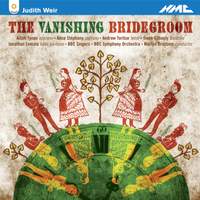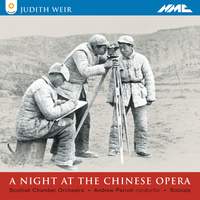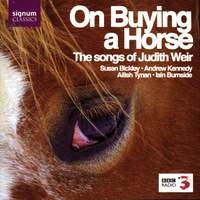Interview,
Judith Weir's The Vanishing Bridegroom
 I've been a great fan of Judith Weir's music since discovering her gorgeous song-cycle The Voice of Desire nearly ten years ago, but until this new recording of her 1990 opera The Vanishing Bridegroom came my way last month I'd never encountered any of her stage works. What a discovery this was! Based on Scottish folk-tales, this three-part story of death, desire and the supernatural crackles with atmosphere and vivid characterisation and is every bit as beautiful as it is unsettling. It was my pleasure to talk to Judith last week about the inspirations and influences behind the work and to find out a little more about its structure and genesis.
I've been a great fan of Judith Weir's music since discovering her gorgeous song-cycle The Voice of Desire nearly ten years ago, but until this new recording of her 1990 opera The Vanishing Bridegroom came my way last month I'd never encountered any of her stage works. What a discovery this was! Based on Scottish folk-tales, this three-part story of death, desire and the supernatural crackles with atmosphere and vivid characterisation and is every bit as beautiful as it is unsettling. It was my pleasure to talk to Judith last week about the inspirations and influences behind the work and to find out a little more about its structure and genesis.
Where and when did you first encounter these folk-tales, and what in particular attracted you to them as an operatic subject? Is the libretto taken directly from the original tales, or was it more a case of using the basic narrative rather than the language itself? >Over the 1970s and 80s I assembled a collection of Scottish vernacular sources and Popular Tales of the West Highlands (in four volumes) I’d had for several years before writing the opera – at first not reading it very closely. I think its mixture of fantastic happenings against a background of elemental certainties – death, marriage, birth etc – led me to think of it as a possibility for opera.
>Wherever possible the libretto comes directly from the original tales but many of the stories are very terse and don’t have much direct speech. Many of the more poetic texts (often used in arias and the more vocally extended sections) come from another collection called Carmina Gadelica collected by Alexander Carmichael.
In terms of the narrative, the three parts of the work are distinct but related - did you aim for similar musical connections, either on a thematic level or through the orchestration? >I think of it as a continuous score – part two picks up where part one stops, and so on. I now see (I don’t think this was so consciously planned while I was writing) that each of the three stories has a basic key – 1. B minor 2. G major 3. D major – which is often very overlaid with other harmonies and deliberately can’t always be heard as being the main tonality, but is always there in the background possibly giving each story a different harmonic ‘tinge’.
Like so much folklore, these Tales of the West Highlands are actually pretty trans-cultural in their engagement with themes like love, sex, money, and death: how specifically 'Scottish' do they feel to you, and how is this reflected in the score? >I agree that the main themes could come from any culture, and it was my hope that the stories would make basic sense wherever they were performed – it wouldn’t be necessary to know about specifically Scottish references. I did though feel there was a grim edge to the stories which I could relate to the stern culture which used to exist particularly in the north and northwest of Scotland when my parents were young – but on the other hand that’s not so different from the social norms depicted in for instance Katya Kabanova.
>In the score there are many more specifically Scottish references to folk music – as formal models or material for variation. Part 1’s beginning and end are based on the ‘long psalms’ from the protestant churches of the Western isles – where the melody is staggered between many voices producing a strangely elongated harmonic effect out of one simple hymn tune. >Throughout Part 2 (with long intervals), the four women are singing my re-invention of a ‘waulking song’ – originally an extended verse-and-refrain chorus sung while beating cloth. Part 3 begins with an (original but folksong-like) melody sung to a folk text - and there are several other such folk music models within the score.
Did you revise the original score at all for this recording/the Barbican performances? >No. By that time there had been two other productions following the premiere – the US premiere at St Louis, and another Scottish production by the RSAMD opera department – and the score was by then completely finalised.
The tales themselves contain several echoes of earlier operas (Lucia di Lammermoor, Gianni Schicchi and The Seven Deadly Sins came to mind in Part One...) - was this something you engaged with via pastiche or quotation? >Lucia is an opera I referred to overtly in the plot of the first story, but to quote it musically was just too far a stretch from my own style. Likewise I can see now that the (comic) part of The Dying Man in Part 1 is straight out of Gianni Schicchi, but at the time I was ignorant of Puccini and didn’t know anything about his ‘Trittico’ operas. Weill’s work has become of great interest to me recently, but at the time of writing The Vanishing Bridegroom it wasn’t in the foreground of my attention.
On a related note, were you influenced by any other composers of opera in English (I thought I caught a whisper of Britten - the Turn of the Screw theme, and shades of Captain Vere - in the Preacher's monologue in Part Three!) >When I was growing up, Britten’s work was all around and it would have been impossible not to absorb it at least a little. Likewise, we don’t have too many other examples of twentieth century English language operas with quite a lot of naturalistic, syllabic word-setting in the repertory, so it doesn’t surprise me when Britten comes to the mind of my listeners. Nevertheless, I don’t know those Britten operas in any great depth – they don’t appeal to me psychologically, although musically of course they have to be admired. After the premiere I can remember one person saying that Part 1, especially the more boisterous sections featuring the Three Sons, reminded him of Bernstein – especially Candide – I think I agree!
The Vanishing Bridegroom is out now on NMC.
Available Formats: MP3, FLAC
Other works by Judith Weir
Like The Vanishing Bridegroom, this 1987 work (commissioned by the BBC and premiered by Kent Opera) has the singers assuming multiple roles to tell the tale of Chao Lin, an orphan in fourteenth-century China.
Available Formats: 2 CDs, MP3, FLAC
This 2006 collection includes the song-cycle The Voice of Desire (a collection of dialogues between humans and birds) and the miniature opera King Harald's Saga (in which the single singer assumes eight roles!).
Available Formats: CD, MP3, FLAC





